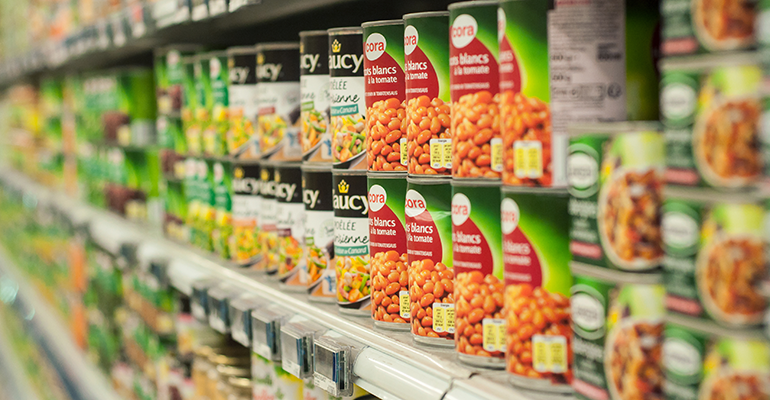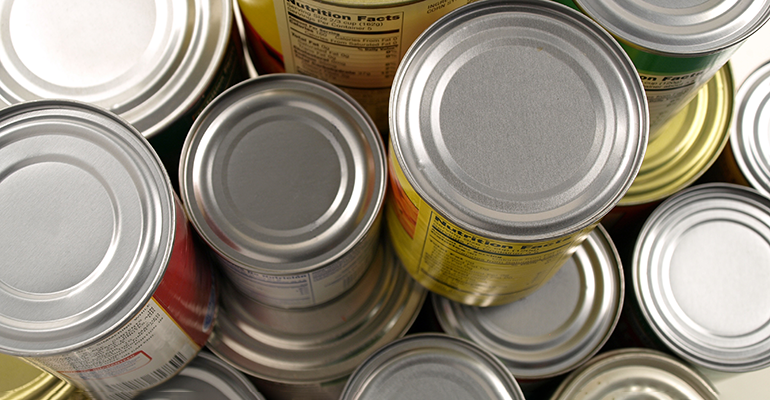News
EFSA’s proposed BPA limits may be ‘totally unrealistic’
2 May 2023
The European Food Safety Authority (EFSA) has proposed limits for Bisphenol A – a chemical known to be harmful to health – that are 20,000 times lower than before, but they may be “totally unrealistic” for the food industry to meet, says one food safety expert.
BPA is a chemical used in polycarbonate plastic, a transparent and rigid type of plastic used to make water dispensers, food storage containers and reusable beverage bottles. It is also used to produce epoxy resins found in protective coatings and linings for food and beverage cans and vats.

It is known to be toxic to humans and, when used in food and drink containers, small amounts of it can migrate from containers to the product itself.
In April 2023, EFSA published a re-evaluation of BPA’s safety, significantly reducing the tolerable daily intake (TDI) set in its previous assessment in 2015.
EFSA’s experts established a new TDI of 0.2 nanograms – 0.2 billionths of a gram - per kilogram of body weight per day, replacing the previous temporary level of 4 micrograms – 4 millionths of a gram – per kilogram of body weight per day.
The TDI is around 20,000 times lower than before, and consumers with both average and high exposure to BPA in all age groups exceed it.
To come to this conclusion and set these vastly lower levels, EFSA scientists evaluated over 800 new studies published since January 2013.
EFSA: ‘Addressing important uncertainties about BPA toxicity’
“This has allowed us to address important uncertainties about BPA’s toxicity,” said Dr Claude Lambré, chair of EFSA’s panel on food contact materials, enzymes and processing aids.
“In the studies, we observed an increase in the percentage of a type of white blood cell, called T helper, in the spleen. They play a key role in our cellular immune mechanisms and an increase of this kind could lead to the development of allergic lung inflammation and autoimmune disorders,” he said.
The Panel also took into account other potentially harmful health effects on the reproductive, developmental and metabolic systems.
EFSA’s scientific opinion will now go to the European Commission and member state representatives, who are responsible for setting limits on the amount of a given chemical that may migrate from food packaging into food.
Expert view: ‘The proposed limits might be totally unrealistic’
But how easy will it be for food and drink manufacturers to comply with these new proposed limits?
“The new limits for BPA will certainly pose a challenge for manufacturers of plastic and metal food containers as the proposed allowed levels is 20,000 times lower than before,” said Rob Kooijmans, CEO of Amsterdam-headquartered food safety consultancy, the Food Strategy Institute.
“Next to this the new limits might also have a significant impact on all food manufactures who use these types of materials either in their ingredient storage, processing or finished product packaging.”
 © AdobeStock/aberenyi
© AdobeStock/aberenyi
This was illustrated by a 2013 study, which found that BPA concentrations in meat and meat products, fish and seafood products, dairy products, fats and oils, and vegetable samples in the US were 0.85, 3.23, 2.55, 1.90 and 8.99 ng/g, respectively, Kooijmans noted.
If EFSA’s proposed limit of 0.2 ng per kilo body weig9ht a day were applied, adults should eat less than 2 g of vegetables a day and less than 16 g of meat.
“This shows that the proposed limits might be totally unrealistic,” he said, while noting that this was based on the data of just one study.
Is EFSA being over-protective?
Kooijmans said that, before new limits for contaminants are proposed, it was recommended to perform a wide test on the current levels of BPA in food products in the EU and to table, from the outset, the potential ramifications for the food industry.
“Next to this, we should also ask ourselves the wider question whether we are not being over-protective,” he told Ingredients Network. “For BPA, an effect on Th17 cells in mice was identified as the critical effect; these cells are pivotal in cellular immune mechanisms and involved in the development of inflammatory conditions, including autoimmunity and lung inflammation.
“This means that long-term ingestion of BPA would not directly lead to illness, but through its effect on the immune system might enhance effects which could have other causes as well. We should be cautious here: by over emphasizing potential health effects, we might end up with a piece of legislation which will make a large amount – if not all – of the food we eat deemed to be unfit for human consumption.”
Related news

Oat Barista: Innovation for game-changing beverages
20 Nov 2025
Oat Barista is a clean label, sustainable, and innovative drink base specifically designed to create the perfect foam in one single ingredient.
Read more
How younger consumers are redefining ingredient choices and rejecting brand loyalty
18 Nov 2025
Gen Z and millennial consumers’ preferences for transparency, functionality, and purpose are “redefining the very nature of consumption itself”, says SPINS.
Read more
Hybrid formats and flexible positioning to disrupt category norms in 2026
17 Nov 2025
Trend forecasters expect food and drink to move more fluidly across occasions, functions, and formats as consumers seek versatility, novelty, and convenience.
Read more
Danone highlights digestive health as potential ‘tipping point’ for food industry
13 Nov 2025
Danone is betting on a food industry “tipping point” that will bloat the market for healthy products, particularly those related to gut health.
Read more
New UPF standard hoped to offer consumers ‘coherence and clarity’
10 Nov 2025
Ingredients companies are being urged to enter “a new era of partnership and innovation” following the launch of the industry’s first non-UPF verification scheme.
Read more
Faravelli at Fi Europe: Showcasing FARA® functional solutions for food and nutra
28 Oct 2025
At Fi Europe 2025 in Paris (stand 72M39), Faravelli showcases FARA® Customized Functional Solutions and a wide ingredient portfolio for food and nutra – delivering quality, innovation, and expertise.
Read more
Agrigum Redefined FIBER
27 Oct 2025
Agrigum has transformed gum acacia into a natural, science-backed fibre that supports gut health, sustainability, and innovation across global food and nutrition applications.
Read more
Expanding boundaries in food & beverage innovation
23 Oct 2025
IMCD and FrieslandCampina Professional expand partnership to deliver Kievit® across EMEA, enabling brands to enhance quality and accelerate time-to-market for tomorrow’s food & beverage creations.
Read more
Amazon Grocery launch aims to balance quality with affordability
22 Oct 2025
Global e-commerce giant Amazon has introduced a new private-label food brand, combining existing Amazon Fresh and Happy Belly products with new everyday items.
Read more
Powerade enters hydration space with launch of Power Water
21 Oct 2025
Coca-Cola’s Powerade brand has launched a zero-sugar, electrolyte-enhanced functional water, marking the brand's entry into the hydration space.
Read more